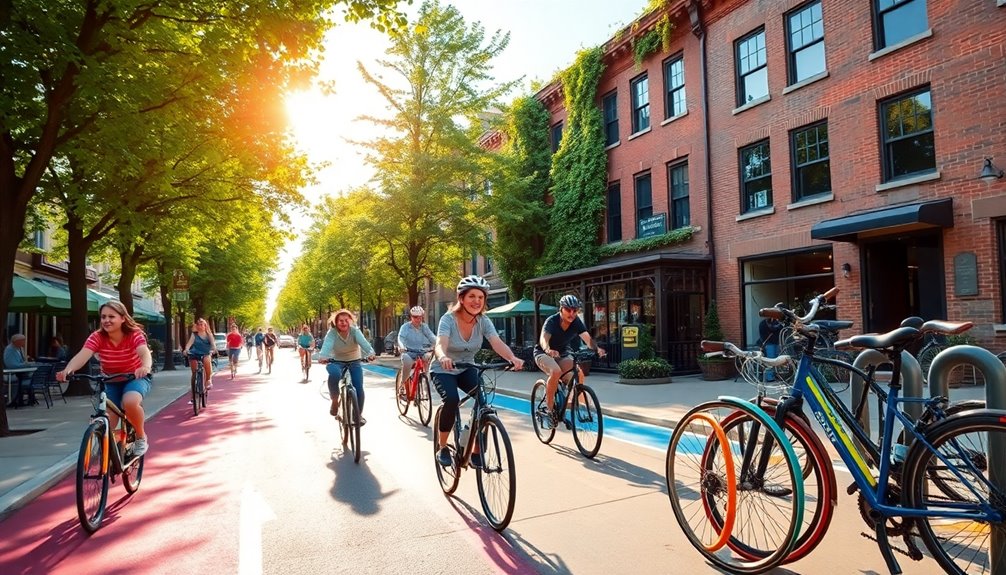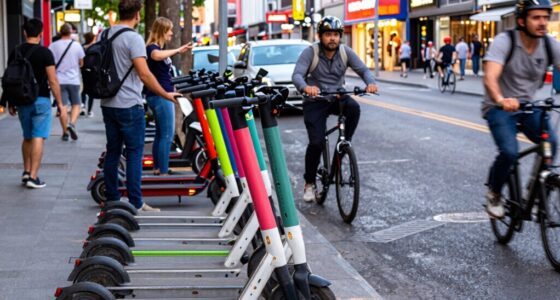If you're looking to ditch your car, consider these five bike-friendly cities. Utrecht, with its vast network of bike paths and impressive parking facilities, is a cyclist's paradise. Copenhagen boasts significant investments in cycling, making it one of the most bike-friendly places worldwide. Münster and its extensive cycling network encourage over 100,000 daily riders. Antwerp's bike-sharing program and upcoming infrastructure improvements make it an attractive option. Finally, Hangzhou's massive bike-sharing system supports a greener environment. Each city offers a unique biking experience, and there's a lot more to explore about what they can offer!
Key Takeaways
- Utrecht, Netherlands: With 420 km of bike paths and a 12,500-bike parking facility, Utrecht offers unparalleled cycling convenience and accessibility.
- Copenhagen, Denmark: Investing over €40 per capita in cycling infrastructure, Copenhagen supports 1.44 million km of daily cycling and prioritizes cyclist safety.
- Münster, Germany: Featuring a 4,500 km cycling network and Vision Zero program, Münster ensures safety for over 100,000 daily cyclists.
- Antwerp, Belgium: Antwerp promotes bike-friendly culture through 100 km of bike paths and community initiatives like car-free Sundays, enhancing urban mobility.
- Hangzhou, China: Home to the world's largest public bike-sharing system, Hangzhou's 570 km bike lane network significantly reduces CO2 emissions and improves air quality.
Utrecht, Netherlands
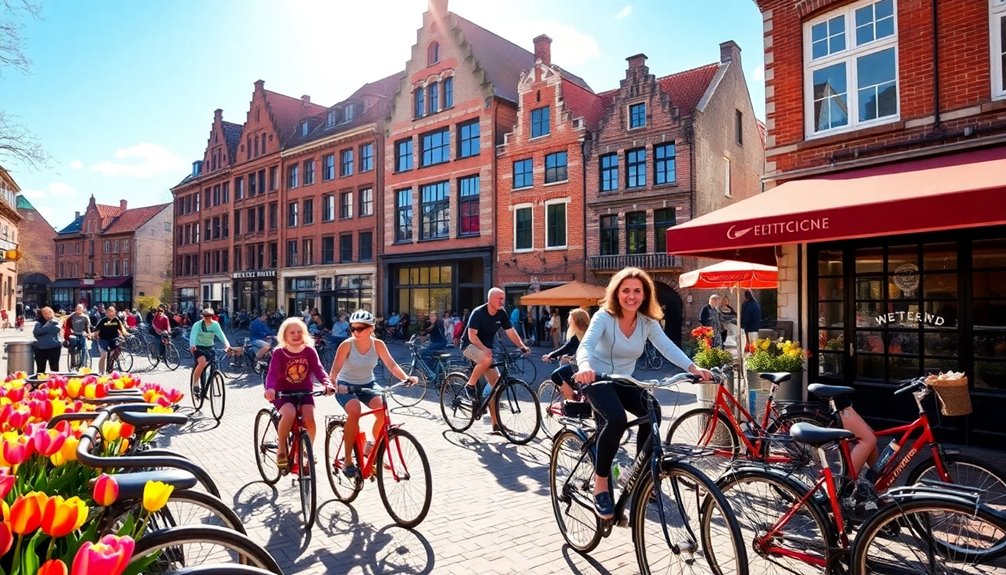
Utrecht, Netherlands, stands out as a beacon of bike-friendly living, thanks to its extensive cycling infrastructure and strong community support for bicycling.
With 420 kilometers of dedicated bike paths and the world's largest bicycle parking facility, accommodating 12,500 bikes, you'll find it easy to embrace cycling as your primary mode of transport. In addition to these amenities, there are over 30,000 bicycle parking spots located near Utrecht Central Station, ensuring that finding a place to park your bike is never a hassle.
Daily, 33,000 cyclists navigate the busiest routes, and an impressive 94% of residents own bikes.
You'll love the well-designed bicycle streets, ensuring safe and comfortable rides.
Plus, with an 87% satisfaction rate regarding bike accessibility and parking, it's clear that Utrecht prioritizes cyclists.
If you're looking for a city that makes biking enjoyable, Utrecht's got you covered!
Copenhagen, Denmark
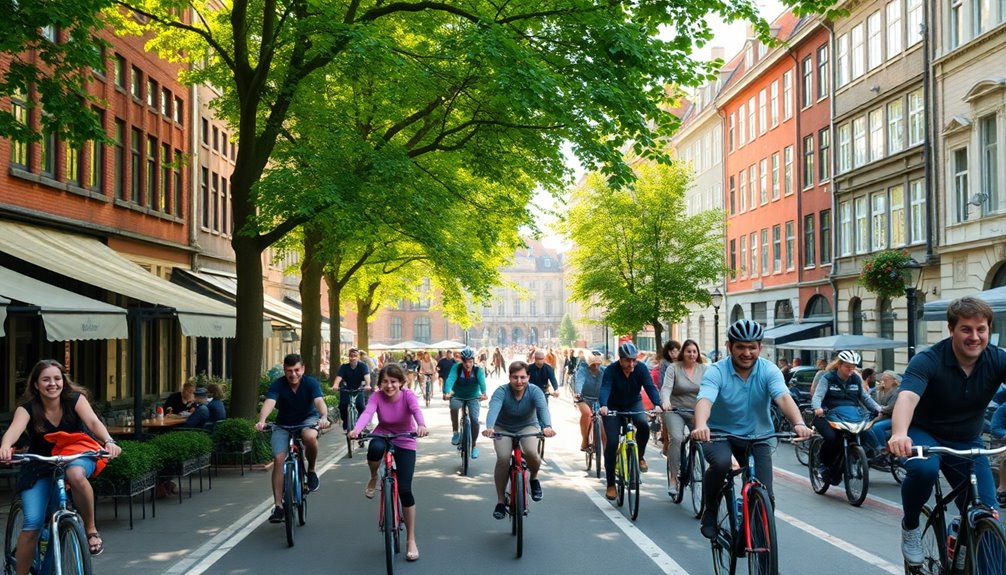
Copenhagen, Denmark has earned its reputation as a model for bike-friendly cities by prioritizing cycling infrastructure and safety, making it easy for you to choose biking as your primary mode of transportation.
With over €40 per capita dedicated to bicycle infrastructure, you'll find a network of separated cycling tracks, bicycle bridges, and regional cycle highways. Daily, 1.44 million kilometers are cycled, with 62% of residents commuting by bike. Cycling investments have been consistently prioritized, reflecting the city's commitment to a carbon-neutral future. Additionally, the city's focus on mental clarity through organized environments fosters a healthier lifestyle for its cyclists.
Safety is a priority, and serious injuries have dropped by 50% since 2004. Plus, innovative initiatives like the green wave system and customized cargo bike facilities further enhance your cycling experience.
In Copenhagen, you won't just ride; you'll embrace a lifestyle that promotes health, sustainability, and community.
Münster, Germany
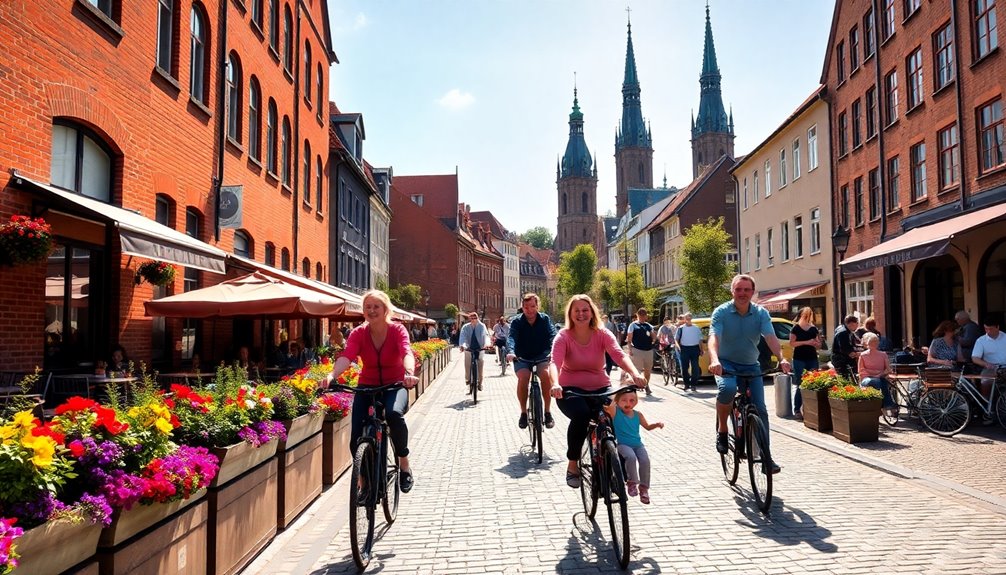
Münster, Germany, stands out as a beacon of cycling culture, boasting an impressive 4,500 km cycling network that makes biking a seamless part of daily life.
With 450 km of dedicated cycle paths and special bicycle roads prioritizing cyclists, you'll feel safe navigating the city. Almost every resident owns two bicycles, and over 100,000 people bike daily for commuting, sports, or leisure activities. This vibrant cycling scene is supported by a dense network of bicycle dealers that cater to the needs of cyclists.
The largest bike station in Germany, located at the main railway station, offers over 3,500 parking spaces.
Thanks to the Vision Zero program, cyclist safety is a priority, with reduced car speeds and traffic monitoring.
Embrace the convenience and eco-friendliness of biking in Münster, where cycling isn't just a mode of transport; it's a way of life.
Antwerp, Belgium
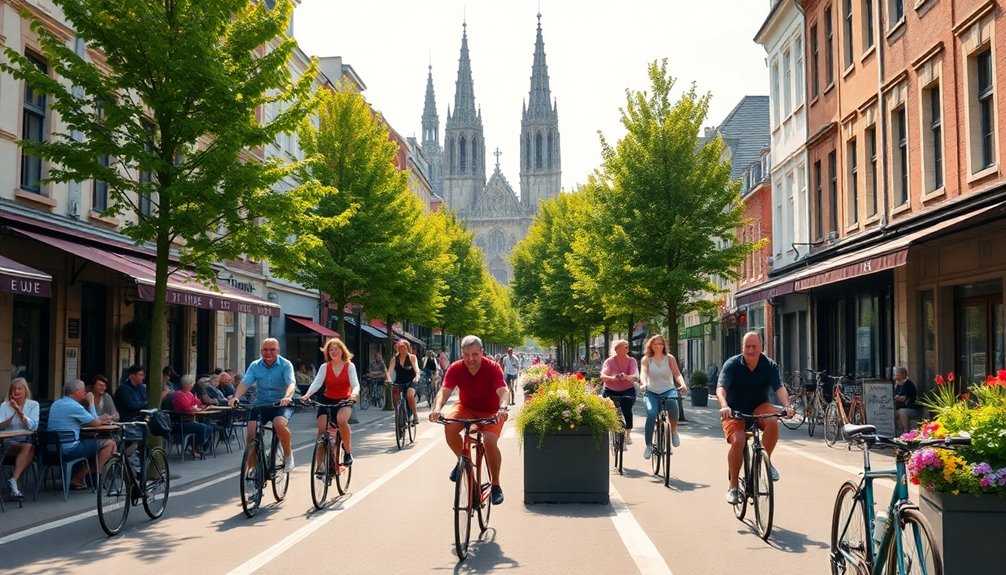
As you explore Antwerp, Belgium, you'll discover a city committed to becoming a cycling haven, with over 100 kilometers of dedicated bike paths that make navigating the urban landscape effortless. The bike-sharing program, Velo, offers convenient access for both residents and visitors, while bicycle super-highways and pedestrian tunnels ensure safe, efficient travel. The city prioritizes your safety with separate bike lanes and plans for 16 new bike bridges. In addition, the expansion of dedicated cycling lanes throughout the city enhances the overall cycling experience. Cycling integrates seamlessly with public transport, making it easy to ditch your car. Community initiatives, like car-free Sundays, encourage a bike-friendly culture. With extensive bike parking facilities and a clear commitment to sustainable urban mobility, Antwerp is paving the way for a greener, more connected future.
Hangzhou, China
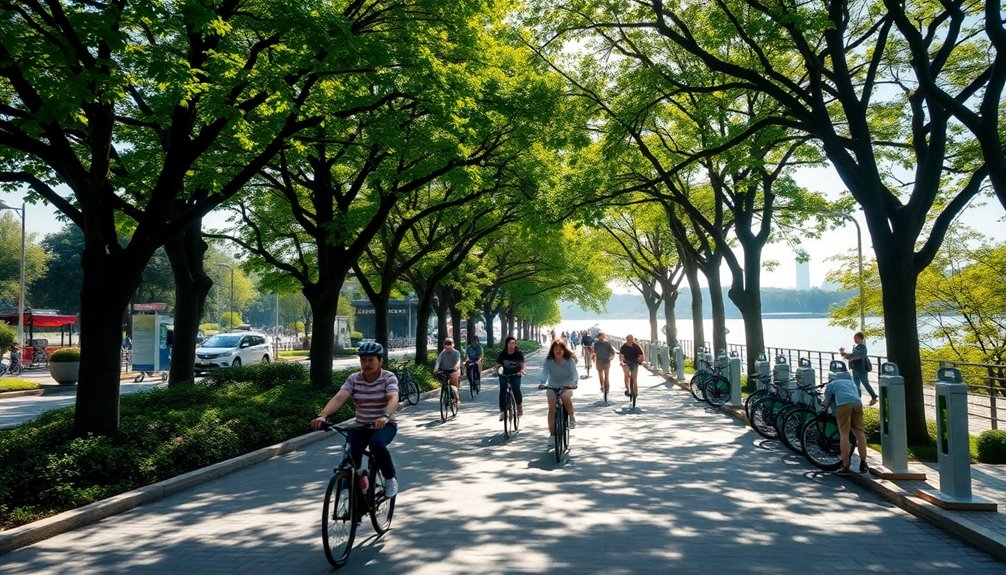
Moving from Europe to Asia, Hangzhou, China, stands out as a model of bike-friendly urban planning.
With a 570-kilometer bike lane network covering 36% of urban roads, you'll find dedicated lanes throughout the city. The world's largest public bike-sharing system, featuring 116,000 bicycles, lets you rent and return bikes effortlessly via QR codes or mobile apps. This initiative has resulted in a cumulative reduction of 1.461 million tons of CO2 emissions since its launch in 2008. Additionally, the city's investment in public infrastructure has facilitated a smoother commuting experience for all cyclists.
Daily, about 250,000 bikes are rented, reducing CO2 emissions significantly. Hangzhou also boasts family bikes and interconnected systems, ensuring your ride is convenient and accessible.
The city's commitment to sustainability has made air quality improvements noticeable, all while creating a seamless experience for cyclists.
In Hangzhou, you'll discover a vibrant cycling culture that encourages you to ditch your car for good.
Frequently Asked Questions
How Do Weather Conditions Affect Cycling in These Cities?
Weather conditions significantly impact your cycling experience. High heat can lead to dehydration and exhaustion, while cold weather may deter you from riding altogether.
Humidity and strong winds can make your ride uncomfortable and challenging. Rain and snow create slippery roads, increasing accident risks.
To enjoy cycling, you'll need to be aware of these factors and adjust your plans accordingly, ensuring you stay safe and comfortable regardless of the weather.
Are There Cycling Safety Courses Available for Beginners?
Yes, there are plenty of cycling safety courses available for beginners!
You can choose from online essentials courses that cover safe riding techniques, in-person classes focusing on traffic cycling, or local programs that teach group riding.
You'll learn about bike handling, traffic rules, and how to navigate various terrains.
With certified instructors guiding you, you'll gain the confidence and skills needed to ride safely and enjoyably in any environment.
What Types of Bikes Are Most Popular in These Cities?
In bike-friendly areas, you'll find a variety of popular bike types.
Commuter bikes like hybrids and electric models are great for daily rides, while folding bikes offer convenience for urban living.
For recreational purposes, mountain and road bikes shine.
If you're looking for something specialized, try bike-share options or cargo bikes for transporting goods.
The trends also include smart and sustainable bikes, making cycling more enjoyable and eco-friendly.
How Do Public Transport Systems Integrate With Cycling?
Public transport systems integrate with cycling by providing bike racks on buses and trains, allowing you to easily bring your bike along.
Transit stations often feature secure bike storage areas, making it convenient for you to park your bike while using public transport.
This integration enhances mobility and encourages cycling, as you can combine both modes of transportation for a more efficient and eco-friendly commute.
Plus, it helps reduce congestion and emissions in your city.
What Are the Average Costs Associated With Bike Ownership?
Did you know the average cost of buying a bike is just $900 compared to a whopping $47,000 for a car?
When you own a bike, you're looking at annual maintenance costs between $300 to $500, with optional insurance costing around $400.
Unlike cars, which can drain your wallet with $1,900 in yearly expenses, biking offers a more affordable lifestyle.
You'll enjoy lower costs and fewer maintenance headaches on two wheels!
Conclusion
Imagine gliding effortlessly through vibrant streets, the wind tousling your hair as you pass charming cafes and lush parks. In bike-friendly cities like Utrecht and Copenhagen, you'll not only escape the confines of your car but also embrace a lifestyle rich in community and adventure. As you pedal through Münster's tree-lined paths or Antwerp's artistic avenues, you'll discover a world where freedom and sustainability unite. Ditch the car and let the rhythm of the city guide your journey.

